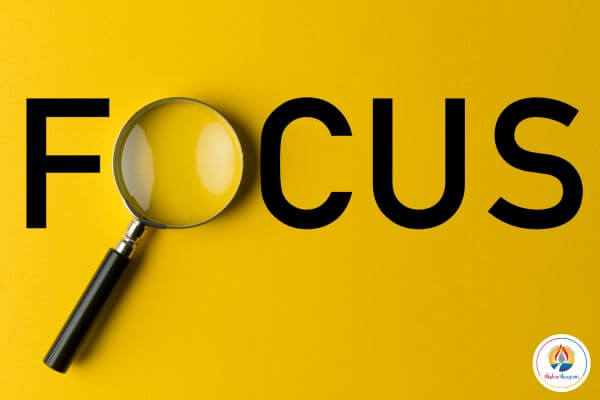Ever opened a book only to realize you’ve read the same line five times? Or sat through a meeting while your mind drifted to a dozen unrelated thoughts? You’re not alone. Many of us struggle to concentrate, often blaming distractions around us. But the real reason usually lies deeper—in the way our minds function. In this blog, we explore the psychology behind focus, why it’s difficult to sustain in today’s world, and what practical steps you can take to regain control. Whether you’re a student, a working professional, or simply someone trying to be more present, this article will help you understand and improve your ability to concentrate.
What Is Focus and Why It Matters
Focus is the mental ability to direct and sustain attention on a task or thought over a period of time. It involves filtering out distractions and giving full cognitive energy to what truly matters.
- Attention span vs. concentration: While attention span refers to how long you can stay focused, concentration is about the depth of that focus.
- Why focus is critical: It’s a key ingredient for learning, decision-making, productivity, and creativity.
- How focus impacts success: High achievers often credit their results to a refined ability to concentrate.
The Cognitive Science Behind Concentration
Concentration isn’t just a habit—it’s a function of your brain.
- The Prefrontal Cortex: This part of the brain is responsible for planning, decision-making, and focusing attention.
- Selective attention: Your brain is constantly filtering sensory input to prioritize what matters most at that moment.
- Attention residue: When you switch tasks frequently, a portion of your mind remains on the previous task, lowering efficiency.
Common Psychological Barriers to Focus
Many psychological factors can erode your ability to concentrate:
- Stress and anxiety: Persistent stress floods your brain with cortisol, which impairs memory and focus.
- Digital overstimulation: Constant notifications, scrolling, and multitasking train the brain to seek novelty over deep work.
- Negative self-talk: Doubt, criticism, and fear of failure can trigger avoidance and distractibility.
- Unprocessed emotions: Suppressed feelings from past trauma or unresolved conflict can hijack your attention subconsciously.
Lifestyle and Environmental Factors That Disrupt Focus
Not all focus issues stem from the mind—your body and environment play a role too.
- Lack of sleep: Sleep deprivation weakens cognitive functions like attention and decision-making.
- Poor nutrition: Diets high in sugar or low in essential nutrients can lead to mental fatigue and brain fog.
- Sedentary lifestyle: Physical inactivity lowers mental alertness and energy levels.
- Chaotic environments: Clutter, noise, or interruptions from people around you break concentration.
Psychological Techniques to Improve Focus
You can retrain your brain with the right mental tools:
- Mindfulness practices: Techniques like deep breathing and body scans calm the mind and increase attention span.
- CBT techniques: Identify and challenge distorted thinking patterns that lead to distraction.
- Reframing thoughts: Shift your mindset from “I can’t focus” to “I’m learning how to concentrate better.”
- Visualization: Mentally rehearsing a task before doing it can boost confidence and attention.
Building Sustainable Focus Through Goal-Oriented Habits
Discipline beats willpower when it comes to long-term focus.
- Set SMART goals: Specific, Measurable, Achievable, Relevant, and Time-bound goals provide direction.
- Use the Pomodoro Technique: Work in focused 25-minute sprints followed by short breaks to maintain stamina.
- Stack habits: Link your focus habit to an existing one—for example, journaling right after breakfast.
- Build intrinsic motivation: Connect tasks to your values and personal growth for deeper engagement.
When to Seek Professional Help for Concentration Issues
Sometimes, the inability to focus may signal a deeper concern.
- Warning signs: Chronic distraction, memory lapses, low productivity, or burnout may need professional attention.
- Conditions like ADHD or depression: These can significantly impair focus but are manageable with proper support.
- Therapy and coaching: Talking to a counsellor can help uncover emotional blocks, while coaching provides actionable strategies.
How Disha Deepan Helps You Reclaim Focus and Mental Clarity
At Disha Deepan, we understand that focus issues are not one-size-fits-all. Our team of experienced counsellors and coaches work closely with individuals to identify root causes—whether emotional, cognitive, or behavioural—and build sustainable pathways to clarity and productivity. Using evidence-based practices like mindfulness, DMIT counselling, career coaching, and emotional wellness sessions, we help you reclaim control over your attention and align your actions with your goals.
Ready to overcome mental clutter and sharpen your focus? We’re here to help.
Conclusion
Focus isn’t just about avoiding distractions—it’s about understanding your mind and supporting it with the right environment, tools, and habits. By recognizing the psychological patterns that affect attention and learning how to manage them, you can improve not just your concentration but your entire approach to work, relationships, and life. If you’re looking for expert guidance to make that transformation, consider reaching out to Disha Deepan for personalized support on your journey to mental clarity.

